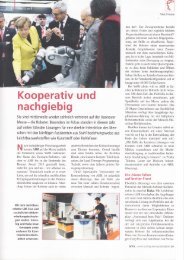35 pv mag 8-15 s. 67
- No tags were found...
Create successful ePaper yourself
Turn your PDF publications into a flip-book with our unique Google optimized e-Paper software.
Storage & Smart Grids<br />
Otto Preiss, MD of ABB's Power Conversion business, has a deep<br />
understanding of solar inverters, PV charging and the importance of storage<br />
technologies. ABB has a long history of integrating storage into electricity<br />
networks, and with three key battery cell partnerships, Preiss believes the<br />
company is set for a powerful role in the storage space.<br />
o<br />
o<br />
E<br />
"lntermittency<br />
won't be an issue<br />
in the futu re"<br />
Interview: ABB's MD of power conversion Otto Preiss has<br />
seen the growing importance of storage technologies, and<br />
believes the company is set to play a powerful role in the<br />
storage space.<br />
What do you make of the battery storage matket at present?<br />
Otto Preiss: On the PV side, we see residential storage quickly<br />
evolving. Looking at Germany and Italy, there is a need today<br />
of around 20,000 to 30,000 units [per annum], ranging from<br />
2 kWh to 6 kwh. We believe that by 2018 10% of the global residential<br />
solar business will involve storage as an integral part of<br />
what is being offered to the market. That's a large opportunity<br />
when you consider 3070 of the PV market is residential.<br />
What is ABß doingto engage with this space?<br />
ABB has always been in energy storage in the commerciai segment<br />
up to utility scale.<br />
Up to now ABB has supplied around 130 MW of batterybased<br />
energy storage for more than 70 projects. This includes<br />
everything from a 250 kW unit, up to 42 MW for <strong>15</strong> minutes<br />
in Alaska. For an installation of this size, which was installed<br />
back in 2002, the technology was lead acid and was about the<br />
size ofa gym hall filled with batteries. This installation generally<br />
provides the service that a spinning reserve would provide<br />
for a remote location. However, in the many projects done so<br />
far, ABB has worked with various battery technologies, keeping<br />
our focus on the power electronics.<br />
This year, in the context of solar, we have been promoting our<br />
residential storage unit called React. We are targeting the residential<br />
consumer who is interested in running his or her home<br />
from a battery which is charged either by solar or from the grid.<br />
That battery provides a controlled deferral ofthe solar energy<br />
supply, so the homeowner sees a significant improvement of<br />
their home's energy independence and the optimization of PV<br />
power self-consumption.<br />
When is React [to be between 3.6 kW and 4.6 kW in capacityl<br />
being released into the market?<br />
It is currently being beta tested because we want to make sure<br />
that it can be [operated] across many hours in different environmental<br />
contexts. Ifall the beta tests go according to plan then<br />
React will be released later this year.<br />
Does ABB have expertise in battery cell technolog itself?<br />
Battery chemistry never was a core technology at ABB, aithough<br />
we ofcourse understand the overall system. In general, but particularly<br />
for home applications, we want to have an optimal<br />
price and the best safety standards available today. These are<br />
found in the automotive industry. So we decided to team up<br />
with Panasonic for the battery celis as they have the expertise<br />
from the automotive business. Moving to the next steP up covering<br />
micro-grid projects, ABB is working on integrated battery<br />
technology to provide the power electronics. In this space<br />
we partner with Samsung. And on large-scale grid solutions,<br />
ABB has a partnership with BYD.<br />
What was the process for deciding against going into battery<br />
cell technology?<br />
This goes back some time. I was running the related corporate<br />
research activities at ABB, so I know it well. When ABB was<br />
thinking about going into battery cell technology we asked ourselves'Where<br />
does ABB want to play?'We believed that there<br />
was still quite a lot of development coming in the battery cell<br />
category. So the decision was to focus on the areas in which ABB<br />
was strong - power electronics, management systems and grid<br />
integration - while developing strategic partnerships with the<br />
companies that are strong in battery cell technology. So we took<br />
a conscious decision not to get into battery technology as such.<br />
Some are describing the growth of storage as being solar's<br />
time to arrive. What role can storage play in this evolution?<br />
Storage can help to eliminate or at least mitigate misconceptions<br />
about the availability of renewables. Whenever we talk<br />
about renewables, the intermittency of supply is always considered<br />
a major issue. This assumption is often overused to argue<br />
that renewables will never fly. The existence and deployment of<br />
storage technologies can demonstrate that there should not be a<br />
misuse of threatening scenarios - either about the need for grid<br />
extensions or to idle large numbers of fossil power plants. I<br />
lnterview by Pv <strong>mag</strong>azine staff<br />
<strong>pv</strong><strong>mag</strong>azine 08/20<strong>15</strong> |














